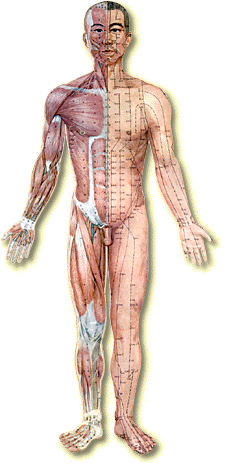Acupuncture

Acupuncture and Oriental medicine are finally gaining acceptance in the United States. By treating the body holistically, it is able to treat a wide range of disorders. From acute injuries to chronic diseases, acupuncture provides a safe and effective form of medicine. Acupuncture is compatible with Western medicine and other alternative therapies, and often a combination of these works best.
Einstein showed us that matter is energy, and that energy is all there is. Numerous cultures have described this energy and called it by many names: prana, baraka, pneuma, spirit, wakan, vital force, orgone, ether and ruach. For the past 500 years, practitioners of acupuncture have called this energy Qi (pronounced "chee"). Qi flows as an invisible current throughout the body. Qi provides the power to accomplish everyday activities. It is necessary for growth, development, movement, maintenance of body temperature, protection against illness and disease, and overall regulation of the entire body.
Different stresses affect meridian and organ systems in different ways, disrupting or diminishing the flow of Qi. For example, a kink in a hose will not provide an adequate supply of water to a plant. Eventually, it will become unable to thrive, grow and blossom. Likewise, a blockage of Qi in the meridians, caused by stressors, will not provide proper nourishment to the cells, tissues, muscles, organs and glands which they feed.
This blockage can manifest in various signs and symptoms. Over time, the body as a whole becomes weakened and susceptible to illness, pain and disease. An acupuncturist develops keen diagnostic skills to effectively evaluate the quality, quantity and balance of Qi flowing within the body and uses various treatment methods to restore and maintain health.
Acupuncture care addresses current symptoms and signs while working with the underlying cause(s) of imbalance. The goal of this dynamic and integrated health care system is to strengthen the body as a whole, in order to prevent future illness and disease.
Einstein showed us that matter is energy, and that energy is all there is. Numerous cultures have described this energy and called it by many names: prana, baraka, pneuma, spirit, wakan, vital force, orgone, ether and ruach. For the past 500 years, practitioners of acupuncture have called this energy Qi (pronounced "chee"). Qi flows as an invisible current throughout the body. Qi provides the power to accomplish everyday activities. It is necessary for growth, development, movement, maintenance of body temperature, protection against illness and disease, and overall regulation of the entire body.
Different stresses affect meridian and organ systems in different ways, disrupting or diminishing the flow of Qi. For example, a kink in a hose will not provide an adequate supply of water to a plant. Eventually, it will become unable to thrive, grow and blossom. Likewise, a blockage of Qi in the meridians, caused by stressors, will not provide proper nourishment to the cells, tissues, muscles, organs and glands which they feed.
This blockage can manifest in various signs and symptoms. Over time, the body as a whole becomes weakened and susceptible to illness, pain and disease. An acupuncturist develops keen diagnostic skills to effectively evaluate the quality, quantity and balance of Qi flowing within the body and uses various treatment methods to restore and maintain health.
Acupuncture care addresses current symptoms and signs while working with the underlying cause(s) of imbalance. The goal of this dynamic and integrated health care system is to strengthen the body as a whole, in order to prevent future illness and disease.